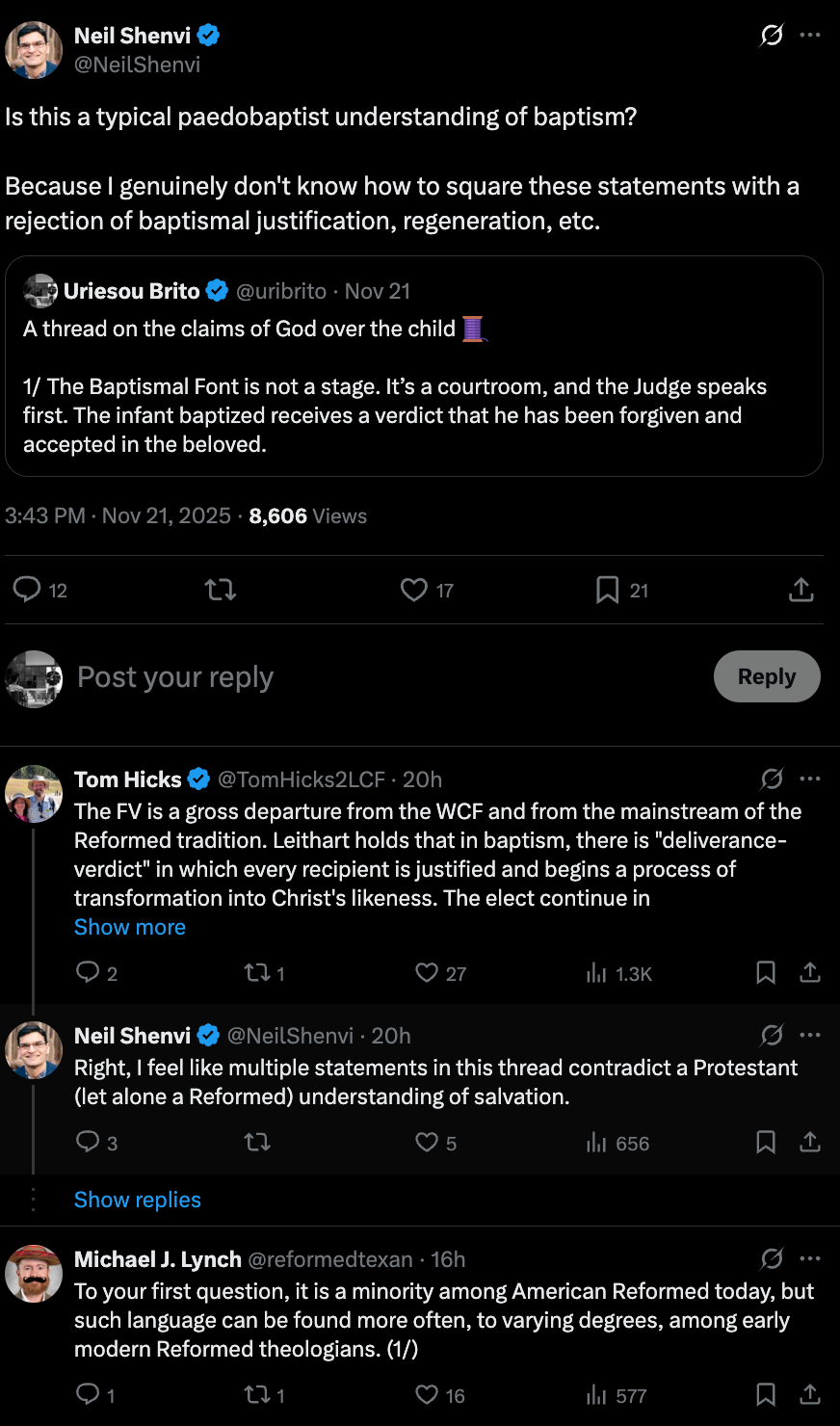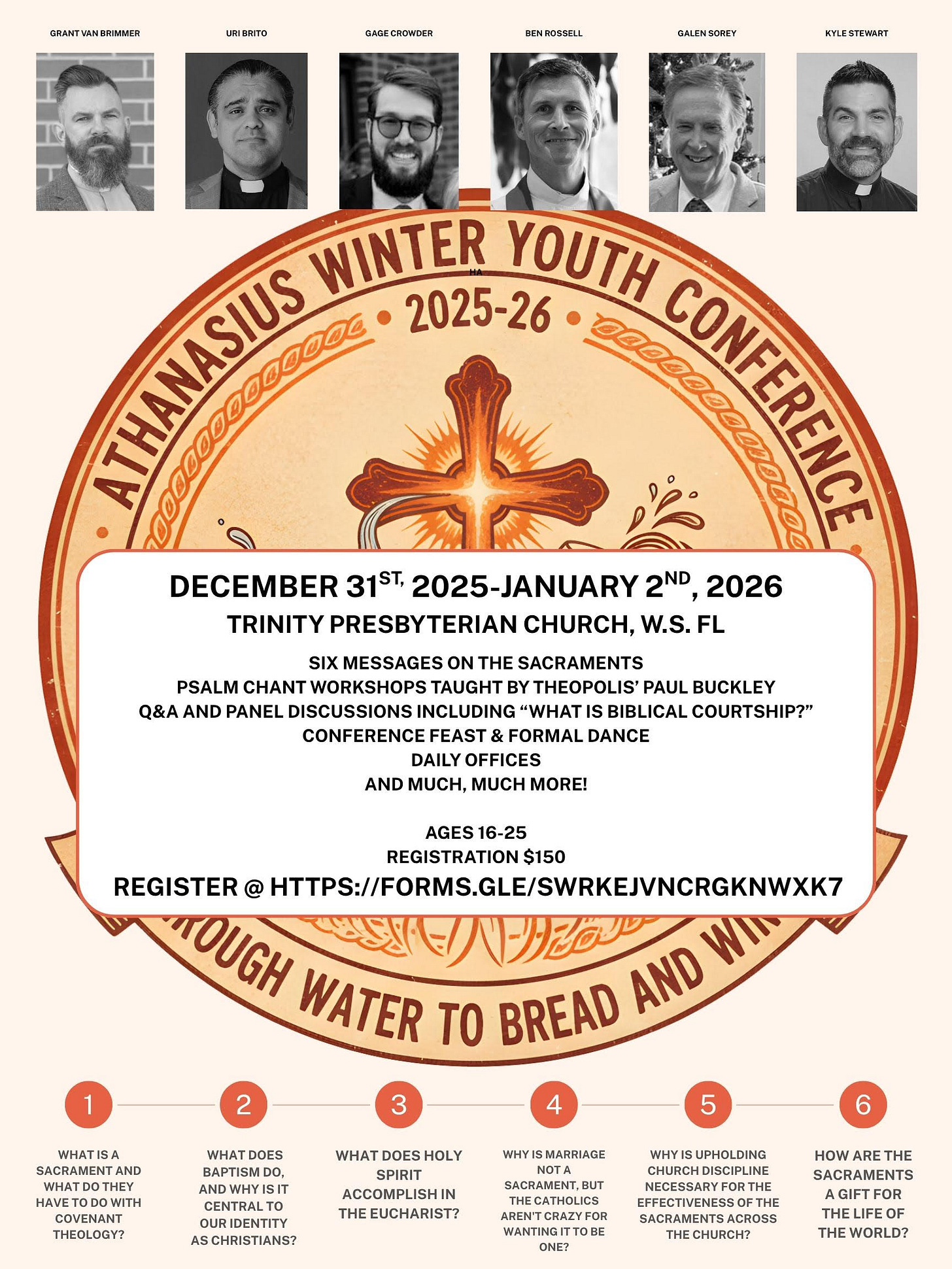A Baptismal Response to Neil Shenvi and That Time a MegaChurch Pastor Quoted our Ruth Commentary
Calvin would not lose a minute of sleep over the ideas I thread together. He would simply lift his well-worn catechism and point to the plain words he taught Geneva’s children.
There has been a bit of a kerfuffle with a baptismal thread I posted this past week. Baptists of all stripes, especially one of a particular variety that antagonizes day and night over the growth of the CREC, decided to opine. Shenvi is an honest inquirer. I am of the type that leaves plenty of room open for discourse with those who pass my smell test.
Shenvi’s concern is whether the thread represents Presbyterian thinking, to which I replied that it certainly does not represent contemporary thinking. In my estimation, modern Presbyterian sacramentology is deeply woven with Baptist categories. Practically, this means that most Presbyterians would rather spend their time explaining what baptism does not do and its potentialities, rather than the clear baptismal language of Scripture and the Calvinian tradition.
But back to Shenvi.
Calvin would not lose a minute of sleep over the ideas I thread together. He would simply lift his well-worn catechism and point to the plain words he taught Geneva’s children:
“Q. 310 — What does it mean to be baptized “in the Name of the Father, the Son, and the Holy Spirit”?
A: It means that we are received into the number and fellowship of the people of God, so that we may be called by His Name, and acknowledge Him as our Father and Defender.
Calvin’s point is not baptismal magic; it’s baptismal objectivity. The Judge speaks before the child ever can. The verdict is declared from the bench, not discovered in the child’s inner recesses. The water is not a theatrical prop; it is God’s public announcement that this child now belongs to Me.
I reject ex opere operato baptismal justification, but affirm that baptism is the God-ordained moment in which justification is publicly, covenantally, and objectively conferred—not magically, but by God’s promise received in faith.
But Calvin also rejects a thin, Zwinglian baptism that floats in the air like a bare symbol with no divine thunder attached. The Reformers insist that God really binds Himself to His Word, and that the child truly receives something: a Name, a claim, a promise, a summons, a verdict.
The problem is that many modern evangelicals—peace be upon them—read sacraments like accountants, not like covenant men. If it isn’t mechanistic, they fear it must be meaningless. But Calvin’s world is older and wiser: God works through means, and His means are not embarrassed by water.
The child at the font is marked by the God who justifies. He is not regenerated by the water, but he is summoned by the God who walks over the waters of death and brings us into a new heavenly abode. Calvin never confuses sign with thing signified—but he also never divorces them like hostile spouses.
So yes, the Font is a courtroom.
Yes, the Judge speaks first.
Yes, the baptized infant receives a verdict—“You are Mine.”
If that sounds too rich, too covenantal, too weighty, it’s because your sacraments are too thin and too divorced from that ancient world that gave the sacraments back to the people.
Notations
Responding to a Query on the Church Calendar
Ruth Commentary Quote
It’s always humorous to see megachurch pastors, especially those who once ministered at the same church where David Platt served, quoting portions of our commentary. I am always honored and somewhat glad to see that, though our theological and political spectrum is quite diverse, the Word of God prevails.
Hotel California
I will be headed to San Francisco/Sacramento for my annual 3-day trip. I will be gathering with some old friends, and then ministering to our CREC work in Sacramento:
CREC Florida Rising
In early January, I am headed to Central Florida to speak at this Youth Conference on the sacraments, and then have some meetings with potential CREC congregations in Tampa Bay.







Well said.